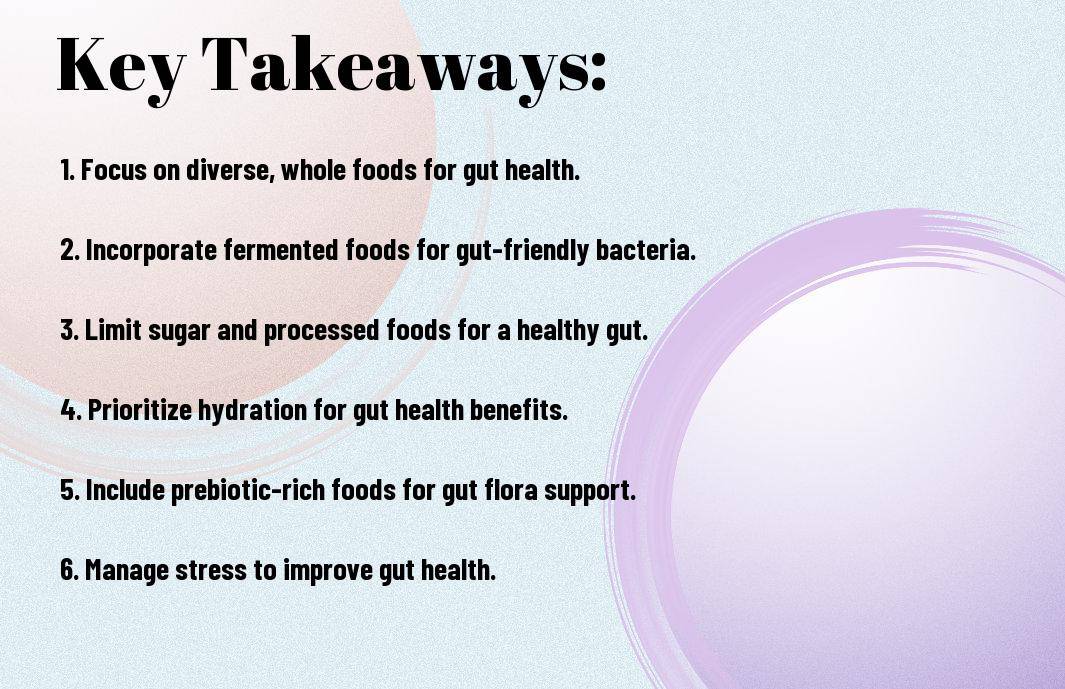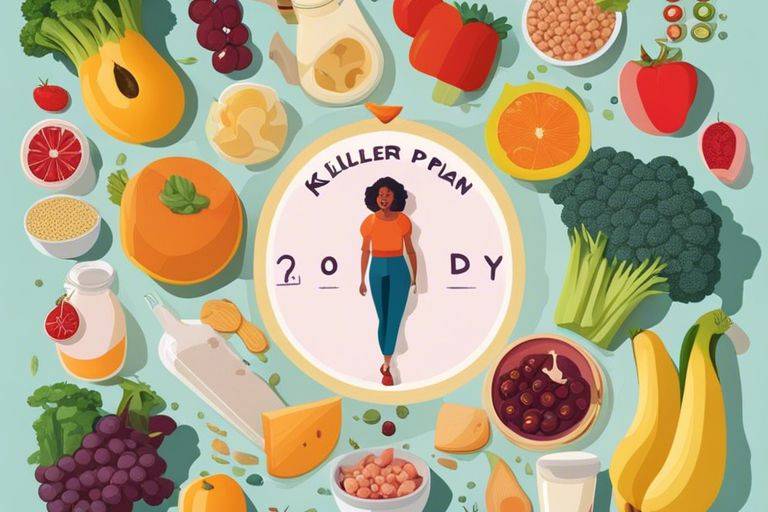
Newsletter Subscribe
Enter your email address below and subscribe to our newsletter

Enter your email address below and subscribe to our newsletter

It’s time to take control of your gut health and transform your life with my 30-day killer gut health plan! Imagine feeling energized, vibrant, and unstoppable, all by making simple yet powerful changes to your daily routine. In this empowering guide, I will walk you through step-by-step strategies, delicious recipes, and effective tips to boost your gut health and feel amazing from the inside out. Say goodbye to bloating, low energy, and mood swings – and hello to a healthier, happier you!


While initiateing on a 30-day gut health plan, it’s crucial to set clear and achievable goals for yourself. By defining what you want to achieve, you can stay focused and motivated throughout the journey. Think about what a healthier gut means to you and set specific targets that align with your vision of optimal well-being.
Identifying your gut health challenges is the first step towards overcoming them. Take some time to reflect on your current habits and lifestyle choices that may be impacting your gut health. Are you experiencing bloating, indigestion, or low energy levels? pinpointing these challenges will help you tailor your 30-day plan to address them effectively.
Plus, be honest with yourself about your diet, hydration, stress levels, and sleep patterns. Understanding the root causes of your gut issues will empower you to make meaningful changes that can lead to a healthier and happier you. Don’t shy away from seeking support or guidance from healthcare professionals or nutrition experts to ensure you have all the tools you need for success.
On day one of your 30-day killer gut health plan, I recommend eliminating processed foods, refined sugars, and artificial additives from your diet. These can wreak havoc on your gut health and hinder the detox process.
To kickstart your gut cleanse, on day one, I suggest incorporating fermented foods like kimchi and sauerkraut, as well as fiber-rich foods like fruits, vegetables, and whole grains into your meals. These will help promote a healthy balance of gut bacteria.
For instance, fermented foods are rich in probiotics, which help restore and maintain a healthy gut flora, while fiber-rich foods support digestion and help prevent constipation, aiding in toxin elimination.
For optimal gut health during the first five days of your plan, I recommend staying hydrated with plenty of water and incorporating digestive enzymes into your diet. These enzymes help break down food more efficiently, aiding digestion and nutrient absorption.
Foods rich in digestive enzymes include pineapple, papaya, and kefir, which can help ease digestive discomfort and promote a healthy gut environment. Stay hydrated to keep your digestive system running smoothly and flush out toxins effectively.

Now, let me tell you about the incredible power of probiotics and prebiotics. Probiotics are the good bacteria that help promote a healthy gut flora, while prebiotics are necessaryly the food for these beneficial bacteria. By incorporating both into your diet, you can create an optimal environment for your gut to thrive.
Healing your gut is crucial for overall well-being. Adding healing foods like bone broth, fermented vegetables, and ginger can help repair and soothe your gut lining. These foods are rich in nutrients that support gut health and aid in the healing process.
Plus, these healing foods are packed with anti-inflammatory and antioxidant properties that can reduce inflammation in the gut and promote healing from within. Incorporating these foods into your daily diet can make a significant difference in your gut health and overall vitality.
With the hectic pace of modern life, managing stress is necessary for a healthy gut. Chronic stress can negatively impact your gut health by disrupting the balance of good bacteria and increasing inflammation. By incorporating stress-reducing practices like meditation, yoga, or deep breathing exercises, you can support a healthier gut environment.
Prebiotics are also necessary for feeding the good bacteria in your gut, helping to maintain a healthy balance. By reducing stress and supporting the growth of beneficial bacteria with prebiotics, you can improve your gut health and overall well-being.

All throughout this 30-Day Killer Gut Health Plan, I’ve been focused on helping you achieve optimal gut health. As you enter days 16 to 25, it’s time to grab your 30-Day Gut Cleanup Kit (Gut Health Made Simple) and continue the journey towards a healthier gut.
The key to this phase is being mindful of how your body reacts as you reintroduce certain foods back into your diet. Listen to your body and take note of any adverse reactions or improvements in your digestion. This phase will help you identify trigger foods and tailor your diet for optimal gut health.
On this phase, I recommend incorporating gut-friendly supplements and vitamins to support your gut health journey. These supplements can help rebalance your gut flora and promote a healthy digestive system. Look for probiotics, prebiotics, digestive enzymes, and crucial vitamins like Vitamin D and B vitamins to nourish your gut.
With the right combination of supplements and vitamins, you can optimize your gut health and support the healing process. Consult with a healthcare professional to determine the best supplements for your individual needs and to ensure they complement your gut health goals.
Movement is crucial for gut health as it helps stimulate digestion and support a healthy gut microbiome. Incorporating regular exercise, such as walking, yoga, or core-strengthening exercises, can improve gut motility and overall digestive health.
To make the most of this phase, prioritize regular physical activity to enhance your gut health journey. Find activities you enjoy and make them a part of your daily routine to support a healthier gut and overall well-being.
Despite reaching the final days of the 30-day killer gut health plan, the journey doesn’t end here. It’s important to maintain the progress you’ve made and keep the momentum going. To sustain your gut health improvements, I recommend investing in the GUT RENEW 30-Day Challenge Basic Kit to continue supporting your gut with necessary nutrients.
One key to creating a sustainable gut health plan is to incorporate variety in your diet, including different types of fiber, prebiotics, and probiotics. This will help nourish a diverse range of beneficial gut bacteria and promote overall gut health.
Overcoming common obstacles like temptation, stress, and social situations can be challenging but not impossible. By staying committed to your goals, planning ahead, and finding healthier alternatives, you can navigate these obstacles and stay on track with your gut health journey.
This is where your determination and resilience will be put to the test. Remember why you started this 30-day killer gut health plan in the first place, and tap into that inner strength to overcome any hurdles that come your way.
Obstacles are meant to be overcome, and by reaching the end of the 30-day killer gut health plan, you’ve already proven your inner strength and dedication to improving your health. Celebrate your progress and success, no matter how small, and use it as motivation to continue prioritizing your gut health every day.
Creating a positive mindset around your achievements will help you stay focused and motivated to maintain your new healthy habits for the long term. Do not forget, progress is a journey, and every step forward is a step towards a healthier, happier you.
I believe in you and your ability to take control of your gut health and transform your overall well-being. Keep up the great work!
Once again, here are some additional tips and strategies to enhance your gut health:
Assume that implementing these tips alongside the 30-day plan will further improve your gut health and overall well-being.
For busy days, pack healthy snacks like nuts, seeds, and fruits to maintain your gut health on-the-go. Remember to stay hydrated with water or herbal teas to support digestion.
Managing your gut health through cooking involves incorporating fiber-rich foods, fermented foods like kimchi or yogurt, and lean proteins into your meals. Cooking at home allows you to control the ingredients and make healthier choices for your gut.
onthegoThe key to mindful eating for gut health is to listen to your body’s hunger cues, savor each bite, and avoid distractions while eating. By being present during meals, you can better digest your food and support your gut health.
Embarking on the 30-Day Killer Gut Health Plan will undoubtedly revolutionize your well-being. By prioritizing your gut health, you are taking a crucial step towards feeling amazing every day. Remember that consistency is key, and with dedication and perseverance, you will see incredible results. For more information, check out The 30-Day Gut-Health Reset Will Improve Your…
A: The 30-Day Killer Gut Health Plan is a comprehensive program designed to improve your gut health and overall well-being in just 30 days.
A: The plan incorporates a combination of healthy eating, probiotics, prebiotics, and lifestyle changes to support and nurture a healthy gut microbiome.
A: By following the 30-Day Killer Gut Health Plan, you may experience improved digestion, increased energy levels, better immune function, weight management, and overall improved health.
A: While specific recommendations may vary, the plan generally focuses on whole, nutrient-dense foods that are easily accessible. Some participants may choose to supplement with probiotics or prebiotics for added support.
A: The 30-Day Killer Gut Health Plan is designed to be a gentle and effective approach to improving gut health for most individuals. However, it’s always recommended to consult with a healthcare provider before starting any new diet or lifestyle program.
A: As with any dietary changes, some individuals may experience temporary side effects such as bloating, gas, or changes in bowel habits as their gut adjusts to the new plan. These symptoms typically subside as the body adapts.
A: You can track your progress by keeping a food and symptom journal, monitoring energy levels, mood, digestion, and overall well-being. Taking before and after measurements or photos can also be helpful in seeing the changes over the 30 days.